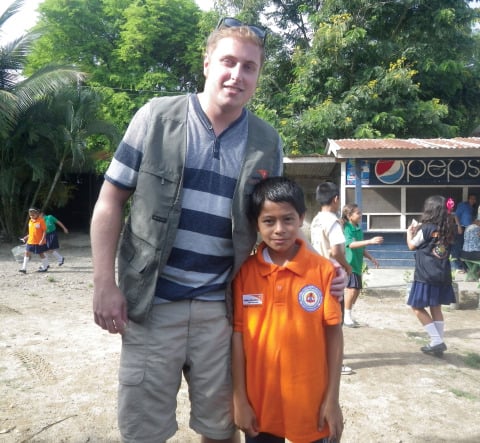JOCELYN DUFRESNE
A potato sack race had never seemed like such a hard feat for Anson Liski as it did this summer in Honduras, where he spent time visiting his sponsored child from the World Vision program.
Liski is one of many World Vision volunteers who have had the opportunity to meet their sponsored child. World Vision is a Christian relief, development and advocacy organization dedicated to working with children, families and communities to overcome poverty and injustice. They work toward addressing challenges in the developing world including political strife, illness and lack of basic necessities.
The Campaign for Children in Saskatchewan organized by World Vision began on Oct. 1 and runs until Nov. 30. An estimated 17,000 Saskatchewan residents currently sponsor over 20,000 children, and the goal of the campaign is to increase sponsorship by 1,500 residents.
Modular Storage, the Liski family business, sponsors 40 children with World Vision. What started as a family activity turned into Restoring Hope, a program which pledges one dollar of each storage unit’s monthly rent toward their sponsored children.
 Liski travelled to Valle de Angeles, Honduras for two months with Intercordia Canada, an organization which “fosters human solidarity by encouraging young Canadians to be morally responsive and develop a respect and appreciation for religious, cultural and socio-economic diversity by living and working alongside others who are different,” as indicated on their website. Liski notified World Vision that he would be in Honduras, and the staff coordinated a day to meet with his sponsored child William, whose surname was not available to press.
Liski travelled to Valle de Angeles, Honduras for two months with Intercordia Canada, an organization which “fosters human solidarity by encouraging young Canadians to be morally responsive and develop a respect and appreciation for religious, cultural and socio-economic diversity by living and working alongside others who are different,” as indicated on their website. Liski notified World Vision that he would be in Honduras, and the staff coordinated a day to meet with his sponsored child William, whose surname was not available to press.
When Liski arrived at William’s school, he was welcomed with a key to the school and a morning of festivities, including a potato sack race. Liski added that it was the hardest race he has participated in as he was still recovering from altitude sickness and was still getting accustomed to the new area after a great deal of travelling.
Finally meeting William proved to be a fairly surreal experience for Liski.
“The relationship between a sponsor child and sponsor is very abstract, so meeting them in person makes it feel more real,” he said.
Liski spent the remainder of his time in the country working in a center for special needs patients with Intercordia Canada.
A political studies student at the University of Saskatchewan, Liski’s said experience helping developing nations has proved applicable to his own education back home in Canada.
“Travelling to Honduras allowed me to improve my Spanish and I learned a lot about myself. I would definitely go back.”
Liski aims to improve Restoring Hope through more consistent letter writing to their sponsored children. His family has recognized how sponsoring 40 children can be a big commitment, especially on a supportive and communicative end. The family business hopes to discover a way to provide this kind of support to all their children.
World Vision encourages university students and their families to consider sponsoring a child.
“Sponsoring a child is the equivalent of buying a cup of coffee a day,” Liski noted, “and if you feel drawn to the cause but cannot afford to sponsor a child, there are volunteer, internship and work opportunities with World Vision.”
A sponsorship means that a child has the opportunity to go to school, drink clean water, eat healthy food, access medical care and live in a safe environment.
Jermaine Hyton, an employee for World Vision, noted that there are opportunities abound for those interested in contributing to the program.
“There will be events for the Campaign for Children at Saskatchewan malls and churches throughout October and November,” he said. “There is also a Youth Ambassador Program for students between the ages of 18 and 29. This is a program specifically for youth with passions in social justice and global poverty.”
Those interested in learning more about World Vision or in finding information on how to contributed to their efforts can visit the organization online at www.worldvision.ca.